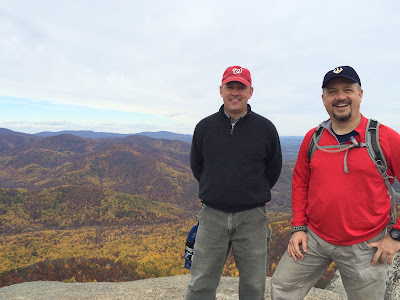 |
| October 29, 2015 |
Looking through my photos on the computer, I came across a picture of me standing with my friend Fr. Christopher Murphy atop Old Rag Mountain. Is it nine years ago already? And we looked like THAT? My, my.
It doesn’t feel like that long ago, because I still see Fr. Murphy several times a year, and we are both the same friends we were then, as for decades before that. But the date is marked on the photo so nine years must have passed. Some things are so much the same; some, visibly, have changed.
Here at the parish, we know another year has passed because we are doing what we do every year at this time, awaiting the arrival of the truck that will bring our lot’s Christmas trees from Canada. It seems late, though, because Thanksgiving fell on its last possible date in November. On the Sunday after that, the day to open our lot, suddenly it is December already. Same as every year, but different.
This year the time between Thanksgiving and Christmas is five days shorter than it was last year, but Advent is two days longer. Both civic and liturgical calendars mark the time allotted for different types of preparation for the different aspects of the same event, Christmas. These are actions and experiences we anticipate and enjoy every year.
Though a turn of the year marks our planet’s circuit of the sun, time does not run in circles, nor do our lives, nor history. In every revolution, the recurring point, the same time is different because we are different, and much in our lives and in the world around us is different as well. Yet for all this time, its passage does not necessarily bring progress in any category, much less every category, as forgetting and remembering, growing in wisdom and strength and diminishment in faculties all occur side by side. The samenesses and the differences reveal a more organic reality, like the growth of wheat: First the blade, then the ear, then the grain in the ear. All is contained within the single living reality, and the differences manifest over time.
The recurring rites of our seasons, both civic and religious, make time intelligible to us, and give us occasion to survey what has been, and what is now beginning. As the seasons change and the calendar and clock march along, we change too. We feel every one of those differences: taller smarter stronger? Grayer heavier slower? The differences are revealed not only in our physical and mental capacities, but also in all our human relationships as well as our disposition and relations with the Lord. We march too, for we cannot pause nor stop, yet we remain the same individuals, the selfsame beings in the divine image. We feel so much the same, until we are startled to awareness. Has it been a year already? Has it been nine years already?
Unlike the civic feasts, our liturgical life reveals the purpose of time, of our time, by laying it out alongside eternity, the everlasting unchanging love that called us into being. The mystery of our salvation is open before us every day, and every day we encounter and benefit from the constancy of the Lord. But over the course of a year, the different aspects of this saving reality unfold before us in the holy liturgy. We are not merely spectators, but participants, and we experience those elements and those aspects in ourselves as well. Divine grace nurtures in us the very life we engage and accompany.
The Church’s worship, our worship, marks time and is marked by time. The new year for us begins with Advent, and the tones and colors change dramatically, even though the prayers and Scriptures bridge that stark change with a continuing, almost unvarying focus on being watchful and ready for the Lord who comes – again, both the same and different. The Lord who comes in judgement is the same Lord who comes to dwell among us, though the effect on our attitudes and expectation can and should be greatly different. It is the same Lord who dies to save us who is the same Lord who rises and returns to the Father’s house to prepare a place for us. Yet it is the differences that resonate in our lives and make us recognize His life in ours.
Our worship of the living God rescues us from both futility and hubris. The futility would be life lived in endlessly recurring circles, and the hubris the false notion of progress toward perfection, every day in every way getting better and better. Each of our lives is unique and unrepeatable, absolutely different and a marvel in its own right. Yet we share the same origin and yearn for the same goal: intimate union with our God and with one another.
Like a birthday party for our children or our parents, marking the same annually recurring day with the same person we have known lifelong reveals how much changes in the same relationship of love. Marking the same annually recurring day with the outpoured life of the Divine Communion, Father, Son, and Spirit, reveals how His gifts seem to vary to meet our changing needs while He stays ever the same.
Looking at an old photo of anyone we love gives us the opportunity to see what was different then, and to delight to know that the person was the same. So too is the sacred liturgy our opportunity to look at our own lives next to the life of our constant Lord, and to delight to know what love changes, and what love treasures ever the same.
Monsignor Smith



